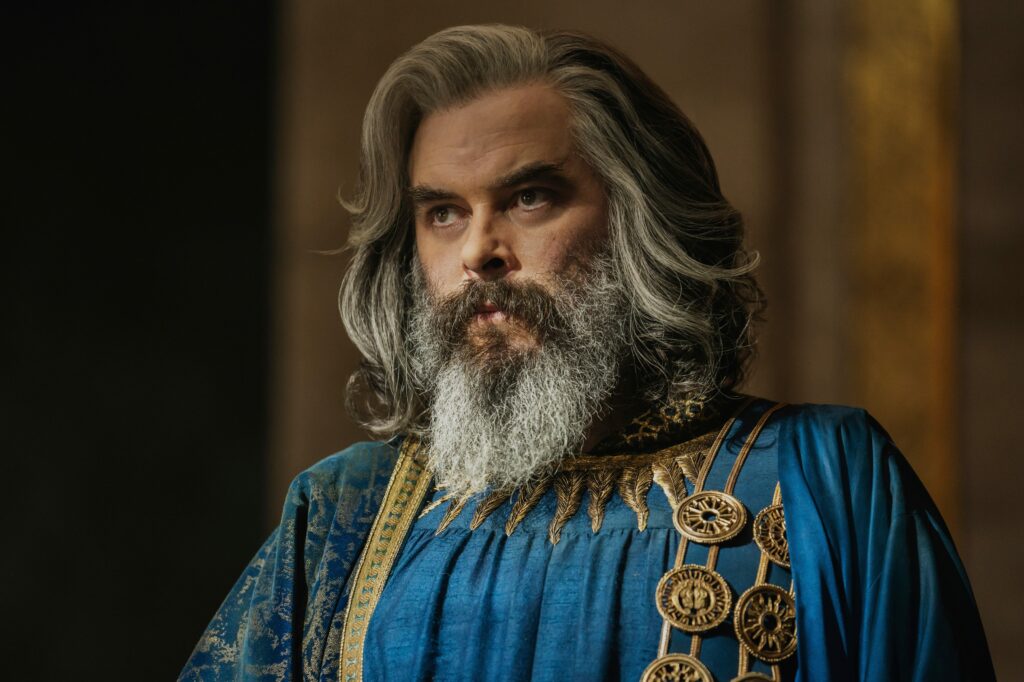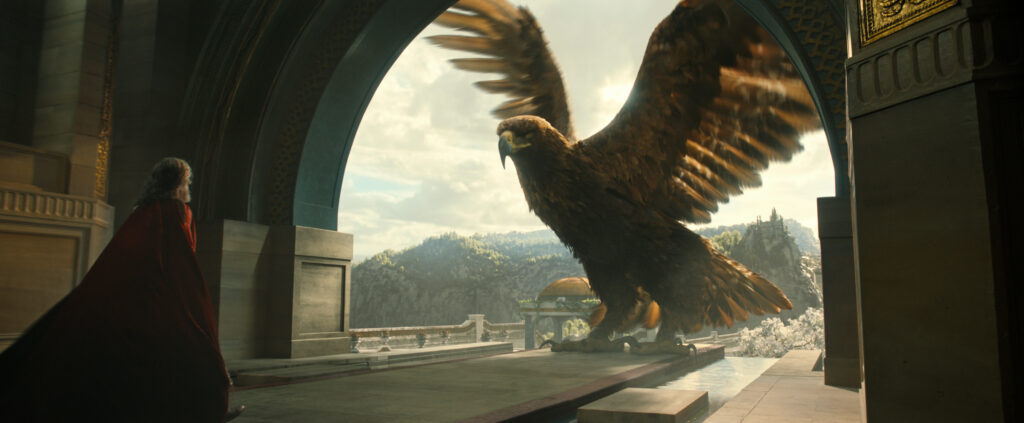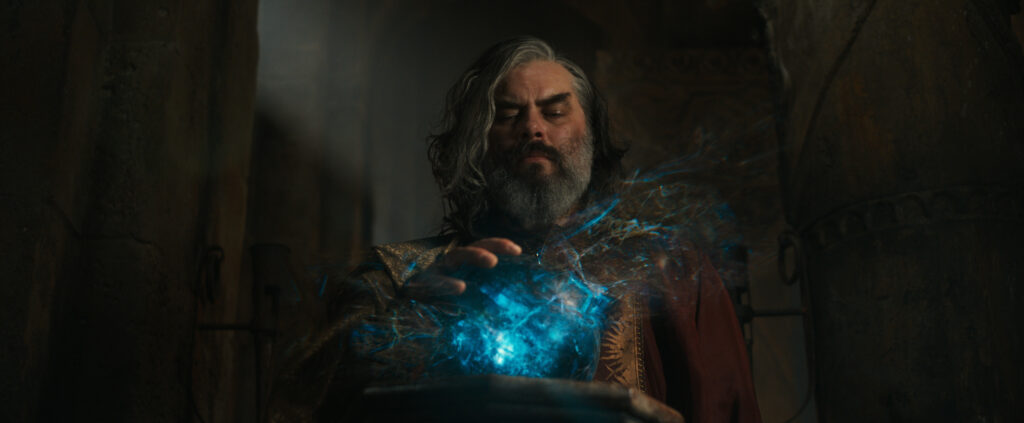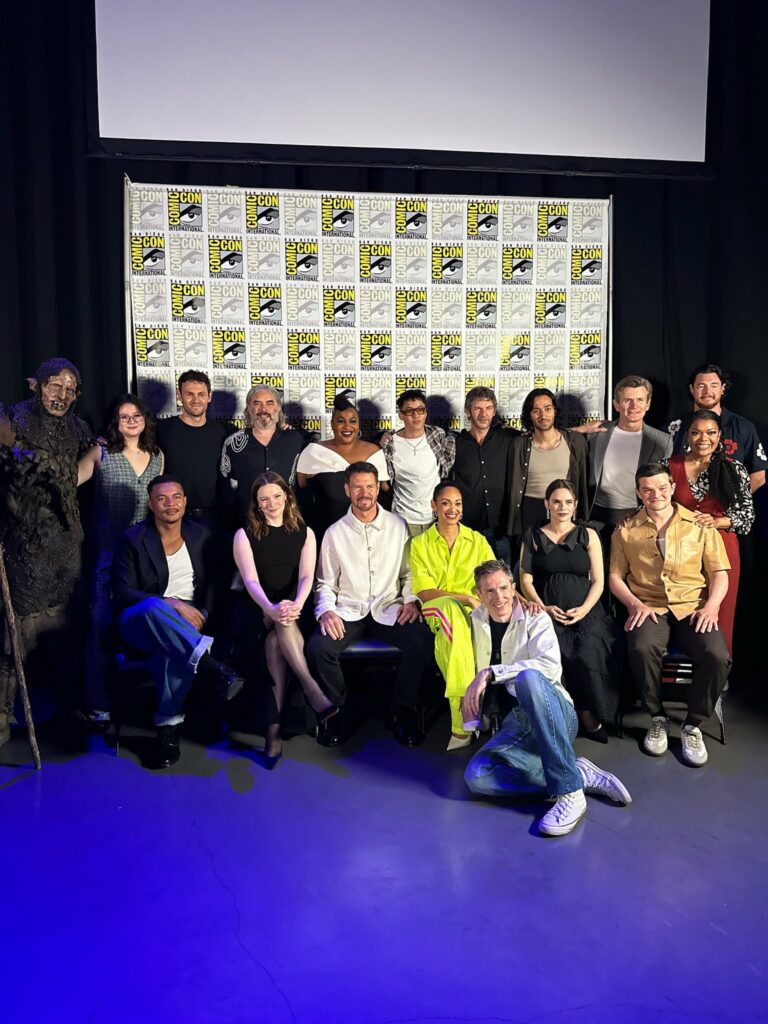We’re looking back on Season Two of The Lord of the Rings: The Rings of Power here at TORn – prompted by our enjoyment of the Rings and Realms retrospective. Check out their latest episode, about Númenor; and then enjoy the thoughts of actor Trystan Gravelle, about his portrayal of Pharazôn – and what may be coming in that storyline.
If you’ve read any of staffer greendragon’s past interviews with cast (not just for The Rings of Power, but going back to PJ’s Hobbit movies) you’ll know that craft and creation of character is something she loves to explore. So Gravelle was the ideal interviewee, gladly taking a deep dive (ha, suitable for Númenor) into what motivates and drives Pharazôn, and what might be in store for the character in Season Three. He also talks about growing up in Wales, and how that land of myth may have prepared him to be a part of Tolkien’s world.

Here’s what he had to say:
greendragon: Hi, Trystan, good morning. It’s an absolute pleasure to chat with you; thanks for taking the time this morning. How are you doing?
Trystan Gravelle: I’m good, thank you! I’ve been enjoying the series. I’ve been sitting down like everybody else and just getting blown away by some of the battle scenes and the fantastic scenes between the two Charlies [Edwards and Vickers], Sauron and Celebrimbor. I’ve absolutely been loving it.
GD: How amazing is both the writing of that battle of wills, and their playing of it? Just spectacular.
TG: Oh yeah, really fantastic. You can really empathize with Charlie [Edwards] and you sympathize with him and you feel for him, but also you can see that, like everybody else, he’s fallen for it; fallen for the charms of this master manipulator. It’s fantastically done I think.
GD: It is! If I had any complaint about Season Two, it might be that I didn’t get enough of Pharazôn, one of my favourite characters – I love the Númenor scenes and plots. But we did get that amazing moment with the eagle! That was pretty spectacular. Were you pleased when you saw that finished and brought to life, when the episode came out?
TG: Oh, yes, absolutely. Yes. You know, you’re always living the dream when you’re on set, and it’s always great when you’re in these epic scenes. It’s just fantastic, the whole experience of it; to see it brought to life like that is something else.
I also like doing the intimate scenes, with Cynthia [Addai-Robinson, who plays Míriel] and Kemen [Leon Wadham]. It’s always lovely because you’ve got two different ways of being, I guess. You’re held accountable to Queen Míriel – or have been, in the past, to the Queen Regent- and with Kemen you have free rein to be yourself. I enjoy doing those scenes with those two, because there is one where there is this glass ceiling and you have to watch what you say; there are consequences to what you say and do with Cynthia. Then with Leon there are none, and it’s interesting to see. You know, they say the true measure of a person is how he treats people he doesn’t need to be polite to. I mean, that should never be the case in any scenario in life, it’s ridiculous – but you know what I mean…

Father/son relationships
GD: Yes, totally. I was actually going to ask you, how do you perceive his relationship with Kemen? Because there doesn’t seem to be much fatherly love going on there. Why is he the way he is with Kemen?
TG: It’s definitely an abusive relationship, for sure. One could argue that he is utilitarian, that he maybe doesn’t feel the same way as other people. Another argument, as well, is that he is just a little bit more old-fashioned, a bit more traditional in his approach to his own son, and demands these high standards be met. Which is very hypocritical, because Pharazôn knows where he came from. He knows his roots; whereas Kemen, as we saw in episode five, doesn’t. So there’s a kind of rootlessness to Kemen, I believe.
Whereas with Pharazôn, he is very much aware of who he is and where he comes from. So the whole thing, you know, when you have the older generation going, to the younger generation, ‘Oh, you’re too soft, you’re lazy, you’re ill-disciplined.’ And maybe the older generation just had it easier than the younger generation! Times were simple, and you knew who you were. You didn’t have all this complexity to deal with.
Or it could just be that, as we saw, that sort of sociopathic behavior is just intrinsic within him. I mean, I know the truth [of the character] – but I think there’s an argument for both there.
Climb every mountain…
GD: So what is his real goal? Season Two has very much been the tale of the two Charlies, of Celebrimbor and Annatar, and that face-off and the forging of rings. And with Númenor, although obviously key things have happened, I feel very much that it’s been setting the pieces on the board for what we’re presumably going to see in Season Three. It has set us up in a very precarious and significant place, with Elendil going west, and Pharazôn and Míriel, and all of their tension.
So what do you perceive as being his real goal? Is it just power in Númenor? Is he looking beyond that? He mentioned immortality, and obviously there’s some envy of the Elves there. What’s driving him?
TG: I think he always had this glass ceiling. We saw him in the first season, and the beginning of the second, where Chancellor is as high as it could possibly get for him; and there you have to, like I was saying, watch what you say and what you do. You’re a totally different person to when the reins are off. And there’s an argument – some might say he’s more suited to be king, than Míriel was to be queen. But there’s also another argument as well, that if it was never meant for you to be king – because it was meant to go to Míriel anyway – then are you, as a person, ready yourself; have you prepared your own mind?
And I think what we saw in episode five is that now he realizes there’s no ceiling for him. He can act with impunity. There are going to be no repercussions, whatever he does. He is the most powerful person in the most powerful kingdom in Tolkien’s earth. So what does that do to you? You start looking outwards and you go, ‘Well, what else is there?’
We’re getting to the core of him now, actually; maybe he’s been lying to himself. What it is, is: ‘I don’t want to die. I found this second wind and it’s actually better than what I used to be’ – when Pharazôn was in his prime, you know, on the high seas and everything. We haven’t seen that, with him as Chancellor. We’ve seen him in the role of Chancellor. And now we’re going to get to see this guy rediscover his past glories; and it might be better than what he had [before]. He’s never been in this position before, where he’s not accountable to anybody.
GD: It sounds a bit like whatever he attains, he’s always going to be looking for what’s over the next mountain; it’s never like, ‘Oh, good, I’ve got this!’
TG: That’s a very human thing, because everything just sometimes seems to be such a chore, you know? We don’t help ourselves sometimes; we make it harder for ourselves. I think that in the human world – in Tolkien’s realm, the world of men – everything is to be overcome. Nature is to be overcome. You’re not meant to have this incredible relationship with nature like the Elves do; and – more complex and slightly brutal, I guess l, but it’s still in sympatico – what the Dwarves have; and what the Hobbits have. The world of men, they have to really work hard to overcome it. They don’t have that time; even though Númenoreans live longer than your average man, they still don’t have that time to be at peace with the ocean and watch trees grow, and have the same relationship with mountains and everything. Everything is to be overcome. There is hardship in their world; and when they overcome that, I guess it’s just in them [to look for] what’s next. The grass is always greener; there will always be something that needs doing; and it’s fast lane till crash! I think that kind of typifies us men, you know – where we go in this world and in Tolkien’s world!

The vision in the Palantír
GD: That’s really interesting, what you’re saying – that even for the Númenoreans with their longer life, it’s still a finite amount of life. And so there’s always that sense of the sands of time running – and fear as a motivator. I’m interested in the motivator of fear for Pharazôn, with what he saw in the Palantír; what has that done to him and his outlook, or his drive?
TG: I mean, it’s really plugged something and it’s really channeled something in him: fear, desperation, anger, a loss of pride, I would say. Because I think he thinks that he’s the ultimate chess player. He is Garry Kasparov and Magnus Carlsen rolled into one, he likes to think! So the fact that somebody may have violated his mind is galling, and it’s something that he may never get over.
I think we’re going to see the repercussions from that; and everything that he does from now on is as a direct result, maybe, from that. If you’ve built yourself up to be sort of physically and psychologically impenetrable, and to have the measure of everybody, and then to get foiled – or at least there’s something may have happened which didn’t come to your attention, which you weren’t aware of; what does that make you do, how does that make you feel? I think we’re going to see somebody who is hurting from that. That really smacked hard, I think!
GD: That’s fascinating. So for you, a lot of the damage that the Palantír does for him is not necessarily what he sees in it, but the fact that he sees anything; that whoever is on the other end of that ‘call’ has the power to present things into his mind.
TG: Exactly! And also, I always say that being a King’s man is an idea, an ideology, and the Faithful is more like a religion; and all of a sudden this antiquated religion has this resource that is far beyond anything that you’ve comprehended before. But you’re down this path now; and you know it’s the right path…
And the fury that these people kept this from you – this form of sorcery, or whatever it is, has been kept from you! You’ve lived in ignorance because your uncle decided to keep you in ignorance, and so did your cousin. There’s going to be repercussions for anybody who is involved there, I think! How dare they do that? How dare they live with that knowledge and not share it?
Because you’ve got to remember, Pharazôn’s knowledge, everything that Pharazôn is, he’s worked hard for. That’s him. You could say it’s pure talent and discipline for Pharazôn, pure discipline and hard work. He’s earned that place. Whereas if Míriel has had this wisdom from looking at a crystal ball – it’s almost a cheap trick! And that’s infuriating – that you [Míriel] have just been given this privileged life, whereas I’ve had to work hard for everything to be me. I’ve had to go through everything that I’ve gone through, whereas maybe you’ve taken a shortcut. I don’t think that’s fair! And I think I’m going to let people know about that as well – things are about to change!
The Pharazôn/Annatar chess match to come
GD: Well, obviously not giving anything away for the content of future episodes, but we know – those of us who’ve read the book – that if it was the Annatar/Celebrimbor show in Season Two, it’s going to be your turn to face off with Sauron coming up. It’s very interesting, what you say about Pharazôn’s belief in his own ability to play chess; and that pride is possibly going to cost him dear when he comes up against the ultimate deceiver. But he presumably feels like, ‘No, no, I can definitely have the upper hand here!’
TG: Well, yeah, it’s funny because, you know, with the relationship between Annatar and Celebrimbor, they were going towards a goal. They were inspiring each other – even though Celebrimbor was being gaslit like you couldn’t believe, poor guy! But they had this goal that they were going towards, and they produced their best work… Whereas I think the relationship between Sauron and Pharazôn is going to be… I’m not predicting anything, but it is starting out where Pharazôn might feel sort of 1-0 down in some game.
I definitely think Pharazôn is going to be very front-footed, and try to establish dominance. I mean, that’s the way he is anyway, but especially after he’s seen what he’s seen; I think there’s definitely going to be… well, we’re not going towards some goal here.
Everything exists on Númenor – like the animals – everything exists there now for the world of men. It didn’t used to be like that; and way back when, before Pharazôn’s time, I think there was a disenchantment with everything on the island, and there was a change, wasn’t there? Even though we live longer [than ordinary men], it’s like they seem to age just a little bit quicker with their bitterness towards the Elves and stuff. I [Pharazôn] think Sauron is going to be just another a tool [he can use] to sort of, I don’t know, just unlock the meaning of life for me, I think.
GD: Or so he hopes!
TG: [laughs] Exactly!
Growing up in Wales
GD: We’ve got three fabulous Welsh lead actors in this show. There’s you, there’s Morfydd [Clark, who plays Galadriel], and there’s Owain [Arthur, who plays Durin IV]. I was reading an interview the other day with Morfydd where she was saying how great it was to be able to speak a little Welsh on set. It made me think… Obviously there are a lot of fantastic Welsh actors! But I wonder also if there’s something about mythology and this kind of high fantasy, which is sort of in the blood for the Welsh. Wales is such a land of myth, and dragon, and King Arthur and Uther Pendragon, and all of that. I wonder if that perhaps gives you guys a bent towards this kind of storytelling?
TG: I think the landscape… Definitely we are, for the most part – and definitely historically – we’re molded by our environment; as everybody is molded by their environment. I think, looking at Season Two with the Elves, when they speak Quenya, Sindarin, it does sound Welsh. It’s like, ‘Oh, that’s Welsh, but I can’t really decipher it. Oh, I kind of understood that word there.’ You know, it sounds very, very similar. It’s as if somebody is speaking Welsh, but you go, hang on a second…They’re in the next room or something!
And I think growing up in Wales… My childhood was growing up in the South Wales coalfield there. I grew up in a council estate on the edge of town with all these woods, and the beach not far. So, yeah, it was climbing trees; it could be an Elven lifestyle, if you like. It could be a Hobbit lifestyle sometimes -people going down the pub and regaling each other with tales. And rugby was a big part of the community; so it’s kind of like that very Dwarven, sort of masculine culture. Yeah, it does lend itself, definitely, to Tolkien’s world, being Welsh. I definitely saw it as an advantage for me to get into character and everything, for sure. Or – because obviously Númenor is different – at least to have a sense of it all.
I mean, seeing the films and reading the books, you know it does speak to you. You go, ‘Oh that is like my childhood: idyllic, rough and tumble and very tough at times…’ You know the boys that you grew up with, they’re all tough. Nothing comes easy; but it is idyllic at the same time.

The wonders of San Diego Comic Con
GD: I wanted to finish by asking you, how did you enjoy San Diego Comic Con this year and Hall H? Was that your first time experiencing something on that scale?
TG: The first time I experienced it was in 2022, and that blew me away; and this time as well! I’m always blown away by it! I have such fond memories every time I go to America anyway; I have fond memories whichever city I’m in, whichever state I’m in. They’re so generous, they’re so welcoming and hospitable, and everybody just has been so friendly every time I’ve gone to America. I really have had the champagne experience of it! It’s a wonderful place; and San Diego is definitely a place I hold dear in my heart, for sure.
GD: Well I, for one, can’t wait to see how your story will unfold in Season Three. I’m a big fan of what we’ve seen in Númenor, and of all of the cast who create that world. It’s interesting that you use the chess metaphor; I feel like that chess board is just so delicately poised right now. And we’re going to plunge in there – which is perhaps unfortunate terminology to use for Númenor! – but we’re going to plunge in there for Season Three.
TG: Very apt! Yeah, it’s going to be fun to do; and fun to watch it unfold, I think.


